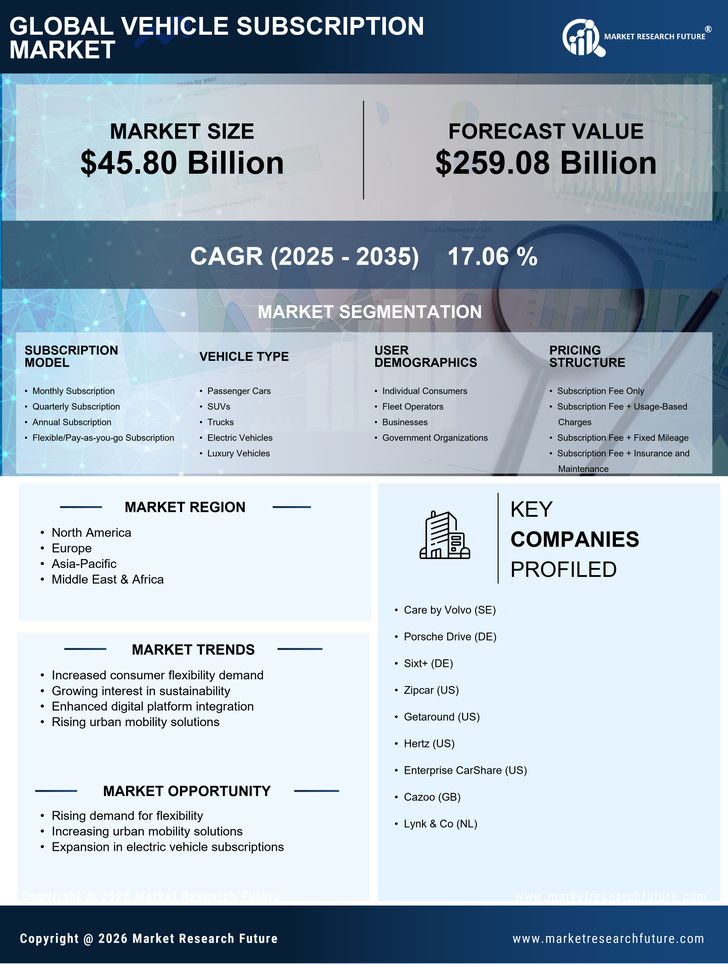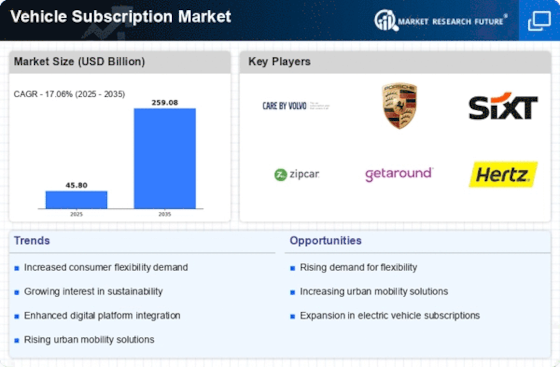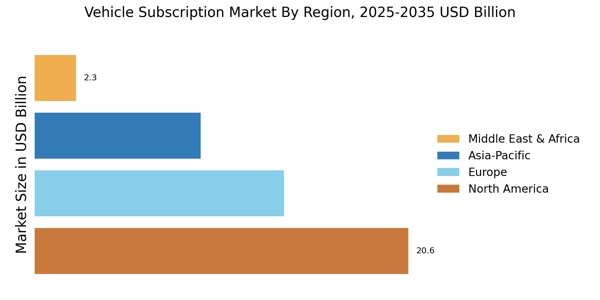Economic Factors
Economic factors are influencing the dynamics of the Vehicle Subscription Market. The rising costs associated with vehicle ownership, including maintenance, insurance, and fuel, are prompting consumers to explore more cost-effective alternatives. Subscription services often provide a predictable monthly fee that encompasses various expenses, making them an appealing option for budget-conscious individuals. Recent economic data suggests that the average cost of vehicle ownership has increased by approximately 15% over the past five years, further driving interest in subscription models. As economic pressures persist, the Vehicle Subscription Market may continue to thrive as consumers seek financial flexibility and convenience in their transportation choices.
Rising Urbanization
The Vehicle Subscription Market appears to be significantly influenced by the trend of rising urbanization. As more individuals migrate to urban areas, the demand for flexible transportation solutions increases. Urban dwellers often face challenges such as limited parking space and high ownership costs, which makes vehicle subscription services an attractive alternative. According to recent data, urban populations are projected to reach 68% by 2050, suggesting a growing market for subscription services that cater to the needs of city residents. This shift in demographics indicates that the Vehicle Subscription Market may continue to expand as urbanization progresses, providing consumers with convenient and adaptable mobility options.
Environmental Awareness
Growing environmental awareness is emerging as a significant driver for the Vehicle Subscription Market. Consumers are becoming increasingly conscious of their carbon footprints and are seeking sustainable transportation options. Vehicle subscription services often provide access to electric and hybrid vehicles, aligning with the preferences of eco-conscious consumers. Market Research Future indicates that around 60% of consumers are willing to pay a premium for environmentally friendly options, suggesting a lucrative opportunity for subscription services that prioritize sustainability. As environmental concerns continue to rise, the Vehicle Subscription Market may see a shift towards greener alternatives, appealing to a broader audience.
Technological Advancements
Technological advancements are playing a crucial role in shaping the Vehicle Subscription Market. The integration of mobile applications, telematics, and data analytics has streamlined the subscription process, making it more user-friendly and efficient. These technologies enable consumers to easily manage their subscriptions, select vehicles, and access real-time information about their usage. Furthermore, the rise of electric vehicles and autonomous driving technology is likely to influence the types of vehicles offered in subscription services. As technology continues to evolve, the Vehicle Subscription Market may experience enhanced operational efficiencies and improved customer experiences, potentially leading to increased adoption rates.
Changing Consumer Preferences
Consumer preferences are evolving, and this shift is having a profound impact on the Vehicle Subscription Market. Younger generations, particularly millennials and Gen Z, are increasingly favoring access over ownership. This trend is reflected in the growing popularity of subscription services, which offer a variety of vehicles without the long-term commitment associated with traditional ownership. Market data indicates that approximately 40% of millennials express interest in vehicle subscription services, highlighting a potential growth area for the industry. As these preferences continue to shape the market landscape, the Vehicle Subscription Market is likely to adapt and innovate to meet the demands of a new generation of consumers.


















